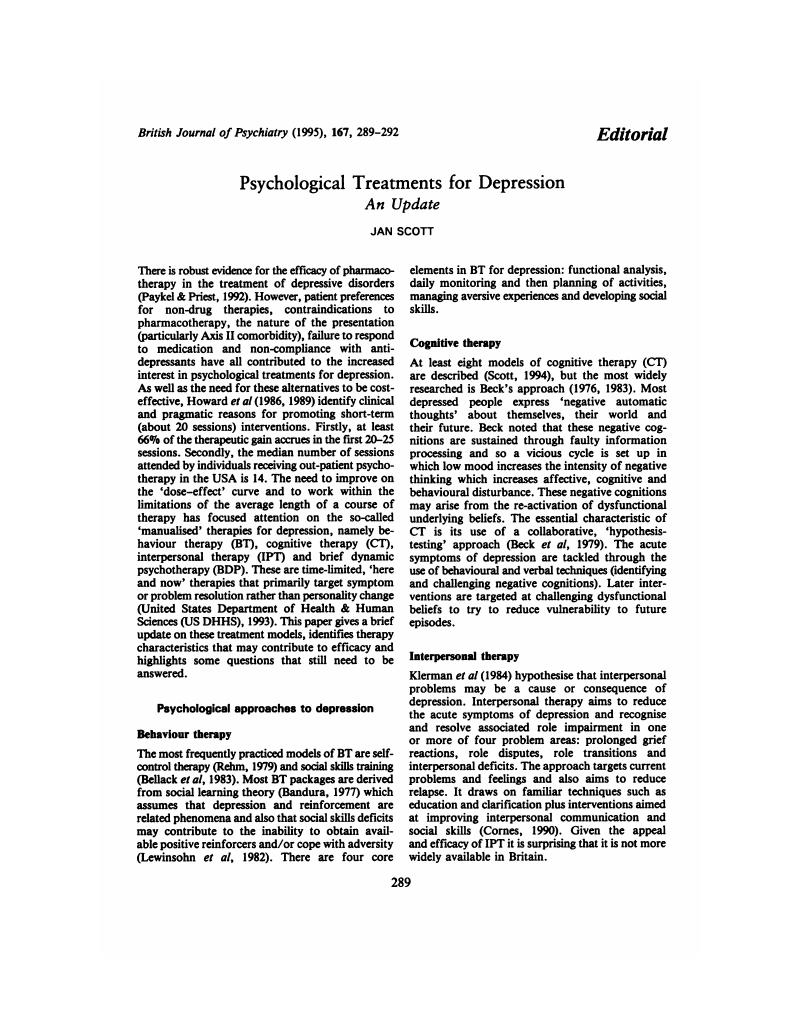Crossref Citations
This article has been cited by the following publications. This list is generated based on data provided by Crossref.
Scott, Jan
1996.
The Role of Cognitive Behaviour Therapy in Bipolar Disorder.
Behavioural and Cognitive Psychotherapy,
Vol. 24,
Issue. 3,
p.
195.
Albeniz, Alberto
and
Holmes, Jeremy
1996.
Psychotherapy Integration: Its Implications for Psychiatry.
British Journal of Psychiatry,
Vol. 169,
Issue. 5,
p.
563.
Freeman, H.
1996.
[No Title].
British Journal of Psychiatry,
Vol. 168,
Issue. 1,
p.
127.
Barker, Philip
1996.
Depression in Children and Adolescents.
p.
139.
Margison, F.
and
Shapiro, D. A.
1996.
Psychological treatments for depression.
British Journal of Psychiatry,
Vol. 168,
Issue. 1,
p.
127.
Bothwell, Robert
and
Scott, Jan
1997.
The influence of cognitive variables on recovery in depressed inpatients.
Journal of Affective Disorders,
Vol. 43,
Issue. 3,
p.
207.
King, Robert
1998.
Evidence-based practice: Where is the evidence? the case of cognitive behaviour therapy and depression.
Australian Psychologist,
Vol. 33,
Issue. 2,
p.
83.
Surtees, P. G.
Pharoah, P. D. P.
and
Wainwright, N. W. J.
1998.
A follow-up study of new users of a university counselling service.
British Journal of Guidance & Counselling,
Vol. 26,
Issue. 2,
p.
255.
Scott, Jan
Gilvarry, Eilish
and
Farrell, Michael
1998.
Managing anxiety and depression in alcohol and drug dependence.
Addictive Behaviors,
Vol. 23,
Issue. 6,
p.
919.
Gloaguen, Valérie
Cottraux, Jean
Cucherat, Michel
and
Ivy-Marie Blackburn
1998.
A meta-analysis of the effects of cognitive therapy in depressed patients.
Journal of Affective Disorders,
Vol. 49,
Issue. 1,
p.
59.
Scott, Jan
and
Moorhead, Steven
1998.
Cognitive therapy training for psychiatrists.
Advances in Psychiatric Treatment,
Vol. 4,
Issue. 1,
p.
3.
Kisely, Stephen R.
and
Jones, Judy
1999.
An Integrated Treatment Algorithm for Pharmacotherapy and Psychotherapy.
Australian & New Zealand Journal of Psychiatry,
Vol. 33,
Issue. 2,
p.
207.
Schestatsky, Sidnei
and
Fleck, Marcelo
1999.
Psicoterapia das depressões.
Revista Brasileira de Psiquiatria,
Vol. 21,
Issue. suppl 1,
p.
41.
Scott, Jan
Teasdale, John D.
Paykel, Eugene S.
Johnson, Anthony L.
Abbott, R.
Hayhurst, H.
Moore, R.
and
Garland, A.
2000.
Effects of cognitive therapy on psychological symptoms and social functioning in residual depression.
British Journal of Psychiatry,
Vol. 177,
Issue. 5,
p.
440.
Anderson, I. M.
Nutt, D. J.
and
Deakin, J. F. W.
2000.
Evidence-based guidelines for treating depressive disorders with antidepressants: a revision of the 1993 British Association for Psychopharmacology guidelines.
Journal of Psychopharmacology,
Vol. 14,
Issue. 1,
p.
3.
Scott, Jan
2001.
Cognitive therapy as an adjunct to medication in bipolar disorder.
British Journal of Psychiatry,
Vol. 178,
Issue. S41,
p.
s164.
Burnand, Yvonne
Andreoli, Antonio
Kolatte, Evelyne
Venturini, Aurora
and
Rosset, Nicole
2002.
Psychodynamic Psychotherapy and Clomipramine in the Treatment of Major Depression.
Psychiatric Services,
Vol. 53,
Issue. 5,
p.
585.
Garland, Anne
and
Scott, Jan
2002.
Cognitive Therapy for Depression in Women.
Psychiatric Annals,
Vol. 32,
Issue. 8,
p.
465.
Fleck, Marcelo Pio de Almeida
Lafer, Beny
Sougey, Everton Botelho
Del Porto, José Alberto
Brasil, Marco Antônio
and
Juruena, Mário Francisco
2003.
Diretrizes da Associação Médica Brasileira para o tratamento da depressão (versão integral).
Revista Brasileira de Psiquiatria,
Vol. 25,
Issue. 2,
p.
114.
Parker, Gordon
Roy, Kay
and
Eyers, Kerrie
2003.
Cognitive Behavior Therapy for Depression? Choose Horses for Courses.
American Journal of Psychiatry,
Vol. 160,
Issue. 5,
p.
825.




eLetters
No eLetters have been published for this article.